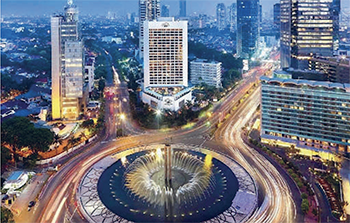
US has indeed been ambiguous since Roosevelt came to power in 1933. Roosevelt’s antipathy towards British imperial power combined with the anti-war policies inherited by the Widroow Wilson’s administration prompted him to protractedly plunge himself into the war against Hitler in Europe, despite repeated requests from Churchil. Until finally the Pearl Harbor incident gave a clear sign that US had to step down directly to help Britain and France, plus expel Japan from China. Then after Truman replaced Roosevelt, the spirit of kinetic war was replaced with the spirit of cold war. The anti-communist spirit was increasingly evident (the Truman doctrine) on the part of the allies which weakened US’s enthusiasm to liberate the British and Dutch colonies in Asia.
The US ambiguity made the position of British troops (accompanied by troops from India) more flexible to carry out a brutal attack on the military and people of Surabaya on November 10, 1945, shortly after Mao and Chiang’s negotiations failed in Chongking, when the British wanted to disarm the Japanese and free the troops allies in Surabaya. This brutal and unfair attack, which was greeted with courageous struggle by the Indonesian people in Surabaya, is now commemorated as National Hero’s Day by Indonesia. US showed the same position when the Dutch decided to launch the First and Second Dutch Military Aggressions two years later.
But four years after that, due to the increasingly volatile Indonesian people’s nationalism (anticolonialAfrican nations like Somalia, Iraq, Iran, Palestine, Syria, Sudan, Libya, Afghanistan, and Pakistan. NATO has not sanctioned the United States on any of them, even carrying out bombings in Serbia in 1999. Additionally, the United States was also engaged in a 22-year-long war in Afghanistan that it withdrew from hastily in late 2021. This long, grueling war resulted in 241,000 casualties on the Afghan side, of which 71,000 were civilians. Among the civilians killed were innocent women and children, many of whom may never have known why they were being killed. Ironically, the US wanted to bring democracy to Afghanistan. To the average Afghan citizen, this so-called “democracy” looked almost as bad as the Taliban. The United States has also used the CIA to fund and offer support for countless military coups and assassinations worldwide throughout the Cold War, namely in Latin America. Ironically enough, many of these naism), international pressure, and Indonesia’s decision to quell the communist rebellion in Madiun, combined with the increasing threat of Stalin in Europe and Mao’s victory over Chiang Kai Shek in China (Chiang retreat to Taiwan), forcing US to pressure the Netherlands to immediately recognize Indonesia’s independence. On the one hand, US assured Amsterdam that Indonesia would not fall into communist hands. On the other hand, US and its allies did need additional troops to compensate for the additional Soviet troops in East Germany.
Then two months after Mao declared the People’s Republic of China (PRC), the Netherlands and Indonesia also reached an agreement at the Round Table Conference on several terms and conditions. The Netherlands recognizes Indonesia’s independence. Meanwhile, the affairs of West Papua will be discussed later. The struggle for independence, the surge of nationalism, and the long geopolitical dialectic did not automatically turn independence into a paradise for the motherland and the people of Indonesia. The dialectic of economics, politics and democracy after the proclamation gave birth to democratic instability and political vulnerability that almost affected all fields. Until finally at the end of the 1950s Soekarno had to declare a presidential decree to end the era of competitive democracy and start the era of guided democracy. This decision finally brought Indonesia into a new chapter a few years later, namely the New Order, after the dark events of 1965 preceded it.
Over the next 32 years, Indonesia moved from guided democracy to the New Order version of democracy, which tended to be very dictatorial. The diffusion parties became two and one Working Group (Golkar). The Berkeley mafia entered the economic arena, controlling Bappenas (National Planning Agency), the Ministry of Finance, and several other ministries. The economy was finally booming because of the support of a fairly measurable economic planning and because it benefited from the Oil Booming era in the 1970s. Suharto “half-heartedly” tried to follow the “Developmental State” style (to borrow Prof. Chalmers Johnson’s term) applied in Japan.
